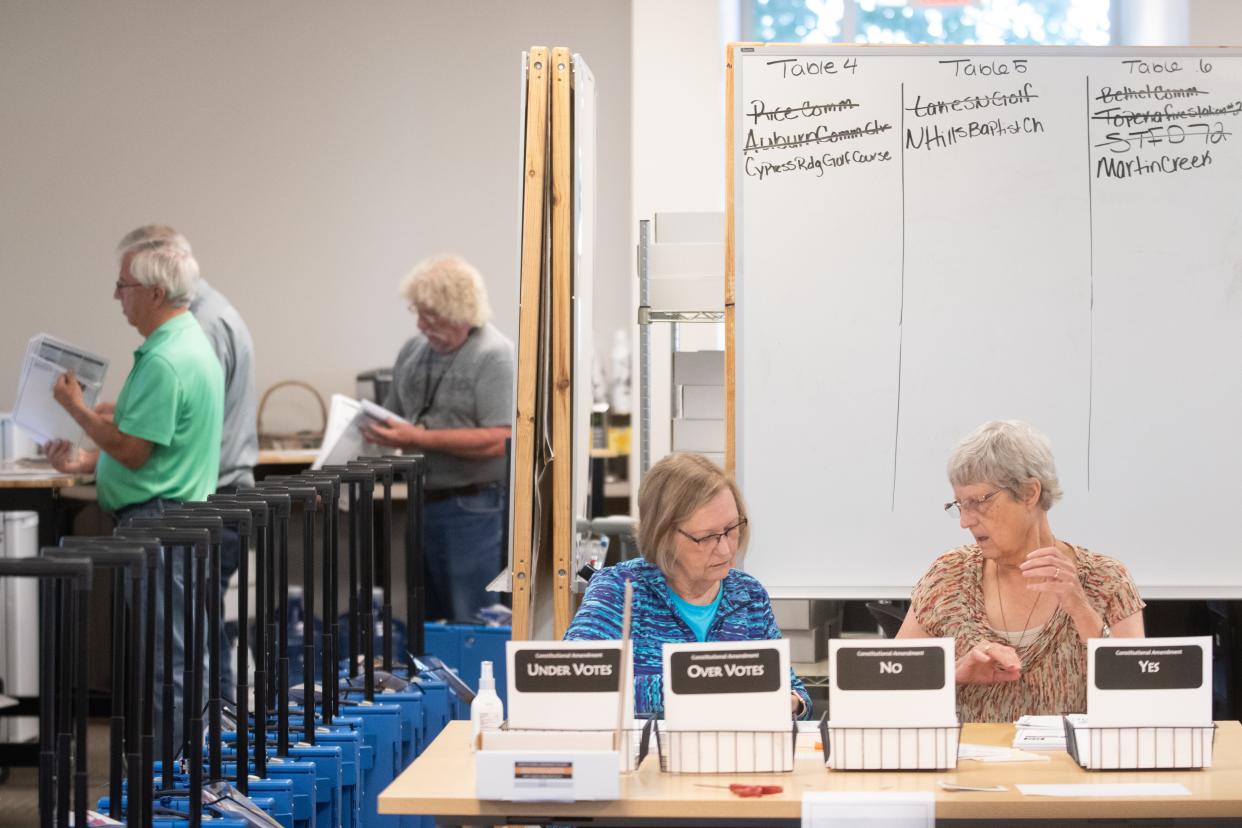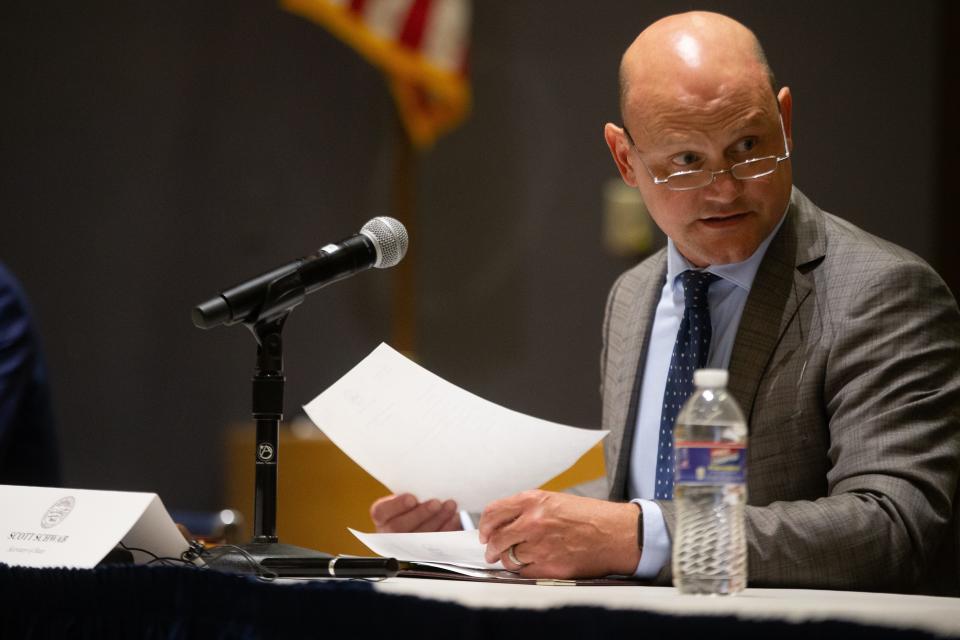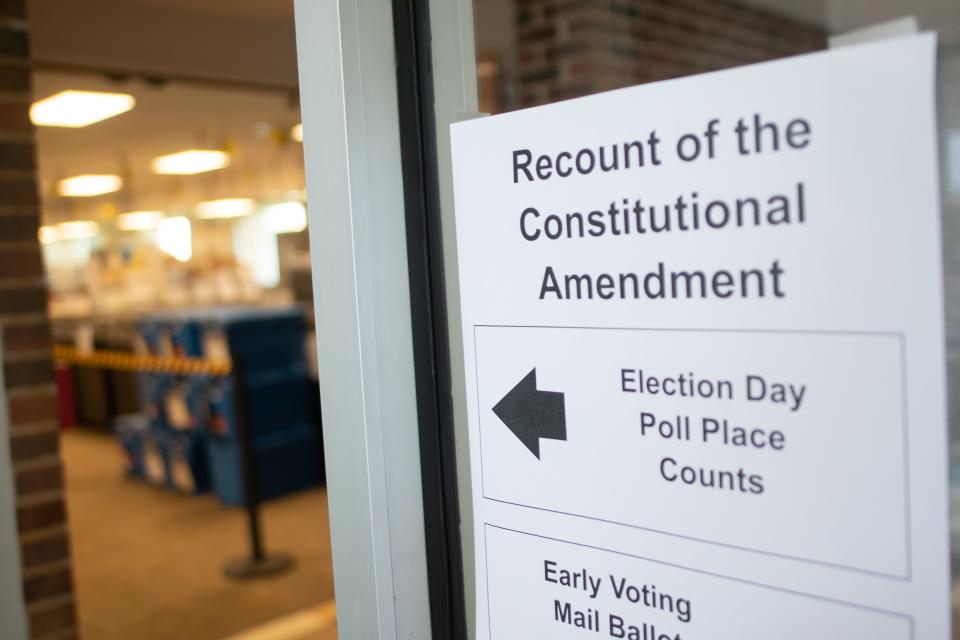Did Kansas abortion amendment recount follow legal guidelines? Chaos may lead to legislative fix.

On Monday afternoon, with the deadline to pay for a recount in the Kansas abortion constitutional amendment race seemingly passed, Johnson County Election Commissioner Fred Sherman took to social media to share his relief.
"5:01 pm has never felt better (again)," Sherman said, accompanied by a string of celebratory emojis.
He spoke just a bit too soon.
After another hour of administrative wrangling, the dust settled and Melissa Leavitt, a Colby resident who has trafficked in election conspiracy theories, and Mark Gietzen, a Wichita anti-abortion activist, paid just shy of $120,000 to recount the results in nine counties.
That includes the state's three biggest counties in the state in Johnson, Sedgwick and Shawnee. Of the nine counties, only one, Thomas County, voted for the amendment. The effort was predicated on baseless claims of fraud in the amendment vote.
More: In bizarre move, recount requested in Kansas abortion amendment. What does it mean?
Meanwhile, a separate recount request from Sen. Caryn Tyson in the Republican state treasurer's race was also pared down from 55 counties — over half of the state's 105 counties — to only four full counties and two partial ones.
The recount effort did little to change the final results in either race.
But Sherman's 180-degree turn on social media underscores the confusion that many election officials, media members and outside observers felt regarding the recount process.
And some are questioning whether Secretary of State Scott Schwab's office properly followed state statute on the timing and handling of the recounts.
"Before, this weekend, I could have told you how recounts are supposed to work," said Davis Hammet, director of the civic engagement group Loud Light. "Now, I do not know, because it seems like we created this new standard."
More: Rep. Steven Johnson declares victory in Republican treasurer primary

Schwab defended his office when asked about the legal questions Friday.
"It is because the statute is very unclear," he said. "But we always interpret the statute as pro-voter or pro-citizen. So we did the best we could."
Some are more sympathetic to the secretary of state's situation.
Instead, there is a belief that the uncertainty is a side effect of a state law that leaves ample room for ambiguity and that legislators need to revisit the statute they return to Topeka next year.
"I think the law needs to be more clear," Harvey County Clerk Rick Piepho said.
More: Rise in child sex abuse cases went unreported to Kansas lawmakers for six years
Timing raises legal concerns about recount effort
The biggest point of confusion? Timing.
Under state law, a recount must be requested by 5 p.m. on the second Friday following the election. In this case that meant the deadline was supposed to be the end of the day on Aug. 12.
Tyson and Leavitt, who led the charge in seeking the amendment recount, filed formal requests by that deadline, but a final cost estimate wasn't yet available on the price tag for a bond used to front the cost of the recount.
Under statute, a recount is supposed to be "initiated" within 24 hours of a request being lodged, with counties given five days to complete the process. That means most expected a recount should have been initiated on Saturday and concluded by the end of Wednesday.
But Schwab's office gave both parties until 5 p.m. on Monday to come up with the money or modify their request and pay for it. They then gave counties until Saturday to complete the recount.
"For the State Treasure race and (abortion) amendment, our office received this bond by 5 p.m., Monday August 15th, which completed the recount filing," Whitney Temple, a spokesperson for the secretary of state's office, said in an email. "Counties have five days to complete this task. State law does not require the bond and request to be submitted simultaneously."
This caught many counties by surprise. Cloud County, for instance, was asked to recount their ballots in the state treasurer primary and completed the process Tuesday, not realizing they had an additional few days.
More: Can Derek Schmidt shake Sam Brownback's 'Bank of KDOT' legacy with ambitious highway plan?
They weren't alone.
"My interpretation didn't match his interpretation of the statutes," said Sen. Richard Hildebrand, R-Baxter Springs.
Hammet agreed with that sentiment.
He argued there could be a case to be made that counties who were still continuing with the recount on Thursday morning had broken the law by unsealing ballots without a lawful order to do so.
Such a situation, he added, could be pretense for further conspiracy theories about Kansas elections.
"There's a huge implication for candidates," Hammet said. "We have two more (constitutional) amendments in November. What will happen if people want recounts of those? What is the procedure? What are these timelines? He needs to square away the timeline that he just had with how he got that out of the law."
Others wondered about the wisdom of letting Leavitt and Gietzen use credit cards to pay for the bond, though acceptable payment options are not laid out in state law.
"If I was secretary of state requiring a bond, I'm not sure I would go that far," said Rep. Vic Miller, D-Topeka, the top Democrat on the House Elections Committee. "I think that's actually pretty generous on his part."
Lawmakers weigh changes in response to recount request

The uncertainty has prompted some interest from legislators and election officials in seeing the law clarified.
'When you have confusion, it kind of just drives everything to extremes instead of 'Hey, let's get everything right," Hilderbrand said. "Let's cut out the confusion. This is it. It's black and white. These are the steps we take. If they're not clear enough that maybe we need to redefine it and make sure it is clear."
There are other potential inadequacies in the state's recount law.
When legislators added requirements for counties to conduct post-election audits, they also gave them more time to conduct the canvass, where provisional ballots are adjudicated, and to certify their results.
Bigger counties require more time to do this, meaning the canvass in Johnson, Sedgwick and Shawnee counties were not scheduled until Monday, Aug. 15.
That left the two treasurer's race candidates with an unenviable position of having to decide on requesting a recount before knowing the full unofficial results.
Temple said the secretary of state's office "would like to work with the Legislature to address several aspects of the recount law," including ensuring the deadline occurs after the last relevant canvass.
More: We found out when sports betting will start in Kansas. Here's what to know.
She added that language was drafted to address that issue in 2019 but wasn't formally introduced in the Legislature.
"I would think that from a candidate standpoint, that they would want to fix it also," said Piepho, the Harvey County clerk.
That's certainly true for Sen. J.R. Claeys, R-Salina, who ran Johnson's campaign for treasurer.
It is his second razor-thin primary race in the past four years — Claeys also managed former Secretary of State Kris Kobach's win over former Gov. Jeff Colyer in the 2018 Republican primary for governor.
Kobach's margin of victory in that race was a slim 350 votes, though Colyer opted against requesting a recount.
Claeys said there should be consideration to moving up the primary election date, though that is unlikely to gain much traction. But making the timing less onerous, he said, should be a priority.
Letting races drag on for weeks, he added, keeps campaigns — most often for Republican candidates, who generally have more competitive primaries — from making their case to general election voters.
"You can really sabotage a campaign," Claeys said.
More: Laura Kelly calls herself the 'education governor.' Derek Schmidt says she broke promises.
‘How much money do they want to keep throwing?’
Some elements of the recount quagmire stem from Kansas' system of election administration, which grants a significant degree of autonomy to each of its 105 counties.
While this is often considered a point of pride for officials, it presents problems when, say, gathering a cost estimate for a statewide recount means 105 phone calls or emails from the secretary of state's office.
"We have a lot of desire for more local control," Claeys said. "You'd think we'd be a less government people. But we have maybe the third-most government in the country and that's unlikely to change."
Shawnee County Election Commissioner Andrew Howell noted this can easily overwhelm the limited staff at the secretary of state's office.
"I think considering the staff and all the things that they're juggling, they're doing a good job of trying to make it happen," he said. "They really should have a few more people."
While statute provides something of a roadmap, it often doesn't drill down into the nuts or bolts of election administration.
Counties have flexibility in everything from setting the date of a county canvass to even how a recount is actually conducted and determining how much it will cost.
Some counties, Piepho said, will still conduct a hand recount by tallying hash marks in a book — an antiquated practice that has been jettisoned in Harvey County.
More standardization, he said, was reasonable.
More: Jerry Farley's $762K exit agreement includes house, country club dues — and a statue
"The state gets upset if the feds are trying to push the same laws on every state, you know, so they want their their own control," he said. "Counties should be somewhat the same, but then there also should be consistency."
Miller agree, particularly when it comes to ensuring uniform cost estimates for recounts, something he believed help smooth the process along.
"If you had a a bond that was tied to the number of votes to be counted, that sounds to me like a fair way to do it," he said.
But while the abortion amendment recount has garnered national attention and engendered no shortage of drama, observers don't believe it will be the new norm for election integrity skeptics.
Piepho said a county commissioner had told him it could wind up being a positive, with a hand count showing the voting machines were accurate and up to the task.
More: With incentive program, Topeka USD 501 staff face dilemma — go to work sick or lose $2,000
While he was weary of the primary, with Harvey County conducting the two recounts, plus early voting for a local bond election, Piepho said he didn't anticipate having to take on such a workload regularly.
"I don't personally think it's going to increase some of this frivolous stuff," he said. "I mean, how much (money) do they want to keep throwing? ... $100-some thousand? I don't have $100,000 to throw away."
Andrew Bahl is a senior statehouse reporter for the Topeka Capital-Journal. He can be reached at abahl@gannett.com or by phone at 443-979-6100.
This article originally appeared on Topeka Capital-Journal: Abortion amendment recount causes confusion, concern in Kansas

